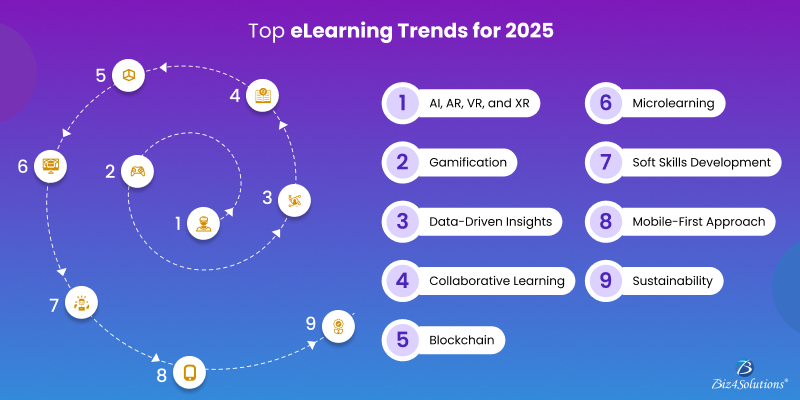The eLearning landscape is evolving at an unprecedented pace, fueled by advancements in technology and the ever-changing needs of learners worldwide. Needless to say, eLearning app development in 2025 needs to stay updated with emerging trends as education providers must stay ahead of the curve to remain competitive and effective. Below are the top eLearning trends shaping the future of education, along with specific use cases that demonstrate their impact.

1. AI-Powered Learning
Artificial Intelligence (AI) is revolutionizing eLearning by offering personalized learning experiences. Adaptive learning platforms use AI algorithms to analyze learner data and adjust content delivery in real-time. This ensures that each learner receives tailored material based on their progress, strengths, and areas for improvement.
Use Case: A corporate training program uses AI to assess employees’ knowledge gaps and recommends personalized modules for upskilling. This approach ensures efficiency and improves learning outcomes.
2. Immersive Technologies: AR, VR, and XR
Augmented Reality (AR), Virtual Reality (VR), and Extended Reality (XR) are becoming integral to eLearning. These technologies provide immersive, hands-on experiences, making complex subjects like medicine, engineering, and science more accessible and engaging.
Use Case: Medical students practice surgeries in a risk-free virtual environment using VR, while AR enables engineering students to visualize and interact with complex machinery.
3. Microlearning for Bite-Sized Education
Microlearning breaks down information into smaller, digestible chunks, catering to today’s learners who prefer on-the-go education. Short videos, quizzes, and infographics allow learners to absorb information quickly and effectively without overwhelming them.
Use Case: A sales training platform offers daily 5-minute lessons to help professionals enhance their skills, ensuring retention without disrupting their busy schedules.
4. Gamification of Learning
Incorporating game elements such as leaderboards, badges, and rewards into eLearning platforms boost engagement and motivation. Gamified courses make learning interactive and enjoyable, encouraging healthy competition and continuous participation.
Use Case: An online language learning app rewards users with points and badges for completing lessons, fostering a sense of achievement and sustained engagement.
5. Focus on Soft Skills Development
As automation takes over routine tasks, the demand for soft skills like communication, teamwork, and problem-solving is rising. eLearning platforms are increasingly offering courses designed to develop these skills, ensuring learners are future-ready.
Use Case: A business school integrates soft skills modules into its MBA program, using role-playing scenarios and interactive simulations to enhance students’ interpersonal abilities.
6. Data-Driven Insights
Advanced analytics are enabling educators to track learner progress, identify bottlenecks, and fine-tune their teaching strategies. Learning Management Systems (LMS) now offer detailed insights into course performance, helping providers create more effective curricula.
Use Case: An online university uses data analytics to identify courses with high dropout rates and revises content to address learner challenges. DigiLearn is an LMS that personalizes the learning journey for K-12 students. It adapts to individual learning styles and provides targeted content to enhance understanding and retention
7. Mobile-First Learning
With the global increase in smartphone usage, mobile-first eLearning is no longer optional. Responsive design and mobile-friendly platforms ensure that learners can access content anytime, anywhere, enhancing flexibility and convenience.
Use Case: The Motivate MD platform includes learning modules related to medical course study and entrance exams, accurate goal setting & tracking goals using color-coded graphs calendar Integration for accurate tracking, and more.
8. Social and Collaborative Learning
The integration of social learning features, such as discussion forums, peer reviews, and group projects, fosters a sense of community among learners. Collaborative tools enable real-time interaction, making online education more interactive and engaging.
Use Case: A global eLearning platform connects students from different countries, enabling them to collaborate on group projects and participate in live discussions with peers and instructors.
9. Sustainability in eLearning
As environmental concerns grow, eLearning platforms are adopting sustainable practices. Digital education reduces the need for physical resources, and providers are exploring energy-efficient hosting solutions and promoting green learning initiatives.
Use Case: A university switches to a fully digital curriculum, reducing paper consumption and carbon emissions associated with traditional classroom setups.
10. Blockchain for Credentialing
Blockchain technology is streamlining the verification and issuance of educational credentials. Digital certificates stored on blockchain networks ensure authenticity and prevent fraud, simplifying the recruitment and admissions processes.
Use Case: A certification body uses Blockchain to issue tamper-proof digital credentials, enabling employers to verify qualifications instantly.
Preparing for the Future of eLearning
The future of education is digital, interactive, and learner-centric. Staying informed about these trends is the key to unlocking the potential of eLearning in 2025 and beyond. Education providers must embrace these trends and integrate them into their software development strategies to thrive in this dynamic landscape. By leveraging cutting-edge technologies, prioritizing learner engagement, and adopting data-driven approaches, providers can deliver impactful and future-proof eLearning experiences.
